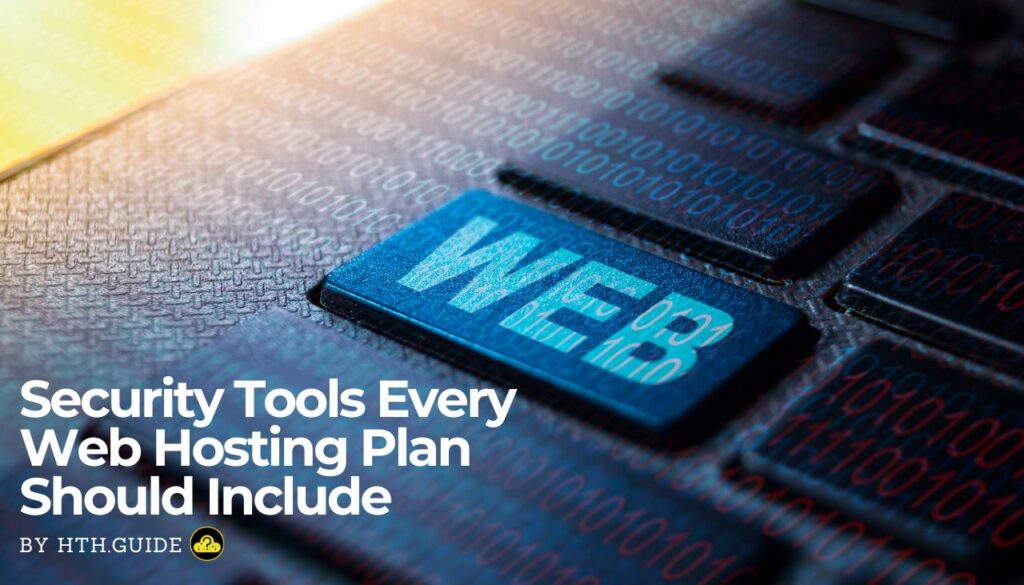On This Page: [hide]
Web hosting security gaps can expose sensitive information and lead to severe consequences, including revenue loss and damage to your reputation. Fortunately, most contemporary web hosting services offer a range of cybersecurity tools to protect your site from various threats.

Let’s explore in detail seven essential security tools and features to prioritize when selecting a secure web hosting provider.
1. SSL Certificates
SSL (Secure Socket Layer) certificates are fundamental security tools for encrypting data transmitted between servers and web browsers. They establish a secure, encrypted connection to protect sensitive information such as credit card details, login credentials, and personal data. SSL certificates play a critical role in building trust with visitors by ensuring that their data remains confidential and secure during transmission.
Why You Need an SSL Certificate:
- Encrypts data to prevent interception by third parties.
- Enhances visitor trust and confidence in your website’s security.
- Protects sensitive information from unauthorized access.
2. Secure File Transfer Protocol (SFTP)
Secure FTP (File Transfer Protocol) or SFTP provides a secure method for transferring files between your computer and the web hosting server. Unlike standard FTP, which transmits data in plaintext, SFTP encrypts data during transmission, ensuring confidentiality and data integrity. It’s essential for securely uploading and managing website files to prevent unauthorized access and data breaches.
Why You Need SFTP:
- Encrypts file transfers to protect sensitive data.
- Prevents interception of data during transmission.
- Enhances overall security of file management.
3. Web Application Firewalls (WAFs)
A Web Application Firewall (WAF) acts as a protective barrier between your website and malicious web traffic. It filters and monitors incoming traffic, blocking suspicious requests and preventing attacks such as SQL injection, cross-site scripting (XSS), and other common web exploits. WAFs are crucial for safeguarding web applications and protecting against emerging cyber threats.
Why You Need WAF:
- Monitors and filters incoming web traffic for malicious activity.
- Blocks unauthorized access attempts and exploits.
- Enhances overall security posture by mitigating web-based attacks.
4. Antivirus and Malware Protections
Protection from virus and malware attacks is essential for detecting and removing malicious software that could compromise your website’s security. In shared hosting environments, where multiple websites share the same server resources, antivirus software helps prevent malware infections and unauthorized access. Regular scans and real-time monitoring are crucial for identifying and mitigating potential threats.
Why You Need Antivirus Protection:
- Detects and removes all types of malware specific to websites.
- Prevents compromise of website integrity and data theft.
- Enhances overall security of shared hosting environments.
5. Distributed Denial of Service (DDoS) Protection
DDoS attacks can disrupt website availability by flooding servers with massive amounts of traffic, rendering the site inaccessible to legitimate visitors. Hosting providers with DDoS protection mechanisms can detect and mitigate these attacks, ensuring uninterrupted service and mitigating potential downtime.
Why You Need DDoS Protection:
- Detects and mitigates large-scale DDoS attacks targeting your website.
- Ensures consistent availability and uptime during cyberattacks.
- Protects against disruptions caused by malicious traffic spikes.
6. Website Data Backups
Regular site backups are critical for disaster recovery and data restoration in the event of a security incident or data loss. Reliable web hosting services offer automated backup solutions that store copies of your website data securely offsite. This ensures that you can quickly restore your site to a previous state and minimize downtime in case of a compromise.
Why You Should Backup Your Site:
- Provides a safety net for recovering from data loss or compromise.
- Minimizes downtime and business disruption during recovery efforts.
- Ensures data safety and availability for critical website assets.
7. Managed Hosting Plans
Managed hosting plans offer comprehensive security management and support, ideal for website owners who prefer hands-off management of security-related tasks. With managed plans, experienced professionals handle security updates, patches, proactive monitoring, and incident response, allowing you to focus on your website’s content and growth.
Why You Should Consider Managed Hosting:
- Expert management of security infrastructure and protocols.
- Proactive monitoring and response to security threats.
- Access to specialized support and guidance from hosting professionals.
Conclusion
When evaluating web hosting providers, carefully review their offerings and ensure they provide these essential security tools and features. Look for comprehensive security tools and measures that align with your website’s needs and level of risk. A proactive approach to cybersecurity will not only protect your website from threats but also enhance visitor trust and confidence in your online presence. Choose a hosting provider that prioritizes web security and invests in modern solutions to safeguard your website’s well-being and reputation.
